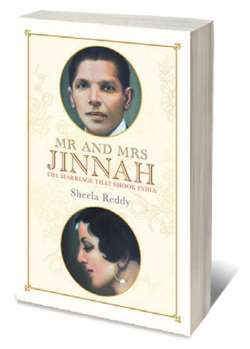Jinnah shaved his moustache, changed hairstyle to marry a teen, says new book
When 40-year-old Muhammad Ali Jinnah popped the question to teenager Ruttie Petit, the only condition put forward by the bride-to-be was: "you have to shave off your moustache." And Jinnah obliged

When 40-year-old Muhammad Ali Jinnah popped the question to teenager Ruttie Petit, the only condition put forward by the bride-to-be was: "you have to shave off your moustache." And Jinnah obliged. Not only did he get rid of his thick hair on his upper lip but he also re-did his hair to impress the lady.
Senior journalist Sheela Reddy has revealed many such anecdotes from the eventful life of the founding father of Pakistan.
In her new book, 'Mr. and Mrs. Jinnah - The Marriage that Shook India', Reddy reveals personal details and episodes from Jinnah's unhappy marriage to the Parsi girl, who was younger to him by 24 years.
In an illustrated lecture about the book held here last evening, Reddy curated a series of rare photos of Mr. and Mrs.
Jinnah and their respective families, complemented with interesting tales from their lives.
Accompanying the photo of Ruttie Petit's father, Dinshaw Maneckji Petit, was this humorous story of Jinnah making the best use of his "cross-examining" skills of a barrister while asking his daughter's hand in marriage.
"Jinnah was having a conversation with Ruttie's father, and he happened to ask him about his view on inter-communal marriage. Now, to sound politically correct Dinshaw said, 'this would be a great thing for the integration of the country'.
"Next question was 'I want to marry your daughter'. It is said that he was thrown out of the door, and they both never met again," Reddy said.
As Ruttie, short for Rattan Bai, was only 16 at the time, they had to wait two years for her to become legally eligible for marriage. As soon as she turned 18 they got married in Bombay at Jinnah's house in 1918. None of her family members attended the marriage.
Reddy said Ruttie, who accepted Islam to get married and took on the name Maryam, had only one condition.
"When he proposed , the only condition she put was you have to shave off your moustache. He obliged, and got married without his moustache. And he also redid his hairstyle. This was very very English movie at that time, and all the Parsi dudes were doing that," Reddy said.
She also narrated the intriguing story behind the making of the book.
Idling her time in Nehru Memorial Library, Reddy stumbled upon a parcel of private letters written by Ruttie to the two daughters of Sarojini Naidu - Padmaja and Leilamani Naidu.
While initially she thought that she had everything that was required to write a book, it was only a matter of time before she realised that there was a long way to go and Pakistan was an important stop in that journey.
"I went to Islamabad and asked for the letters exchanged between Jinnah and Petit and others. In all this, I did not realise I had written my Indian address in the register.
"Smelling something wrong, they asked me to leave and I was debarred from that place. Even then I managed to get the files with the help of my Pakistani friend, but then there was nothing, barring some letters written by Jinnah's daughter to him," she said.
The author's quest ended after she returned to Mumbai on the recommendation of Pakistani scholars who told her, "You are in a wrong place, go to Bombay." Jinnah spent a major part of his life in Bombay, where he lived until he moved to Pakistan after the partition in 1947.
Ruttie died in 1929 of cancer and Jinnah visited her grave in Bombay one last time before leaving for Pakistan. PTI MG TRS BK SC VJ